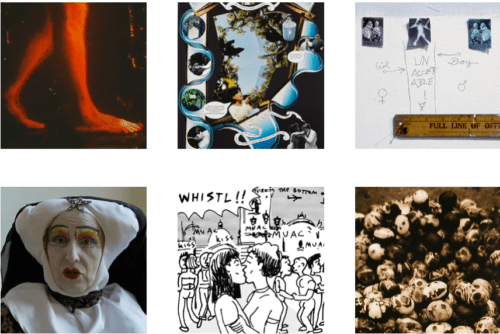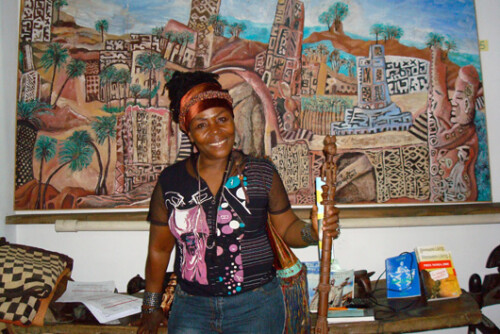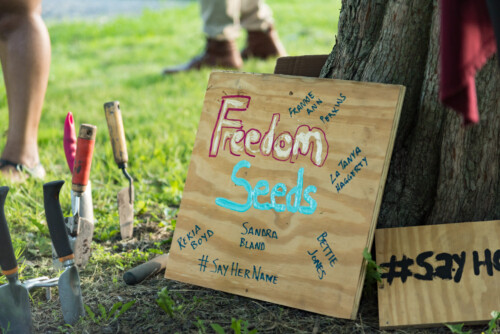Dána-Ain Davis is the author of Reproductive Injustice: Racism, Pregnancy, and Premature Birth (New York University Press, 2019). Virginia R. Dominguez is the author of Anthropological Lives: An Introduction to the Profession of Anthropology (Rutgers University Press, 2020) with Brigittine M. French.
Virginia R. Dominguez: You have not always written about the medical world. What led you to do so in your most recent and award-winning book?
Dána-Ain Davis: I was trained by three medical anthropologists and realized that, although I never considered myself a medical anthropologist, I was always doing research that was in the field of medicine. After years of non-profit and communications work at The Village Voice, WNYC-TV, Essence Magazine, and the YWCA of New York City, I began working at Village Centers for Care and its HIV/AIDS programs. I then went to work at Bronx AIDS Services, followed by the Reproductive Rights Education Project at Hunter College. I then worked as a consultant for NYU’s Mammogram Project and the Healthy Girls/Healthy Women Initiative at the Ms. Foundation. And, of course, my MPH [Master of Public Health] work focused on violence against women as a public health issue. So I think the trajectory of my career has mostly involved work around health-related issues: HIV/AIDS, breast cancer, violence against women, and reproductive health.
My latest book was somewhat serendipitous, as I describe in the introduction, but I have been doing reproductive rights, freedom, and justice work since the 1970s, just after Roe v. Wade was decided. I benefitted from services made possible by the Roe v. Wade decision, then did work with NARAL-NY, followed by work with the National Network of Abortion Funds (NNAF). I participated in CLPP [the Civil Liberties and Public Policy Program at Hampshire College] for years, taught women’s health classes at Hunter College, and worked with Rosalind Petchesky on her renowned reproductive rights project, the International Reproductive Rights Research Action Group for which she received a MacArthur Award.1 But I left the movement disillusioned after realizing that it had so little interest in Black women’s experiences. I remember on one occasion I was asked to do an information session for my fellow board members of NARAL. I wanted them to understand the issue of racism and reproduction. I had them read the chapter “Racism, Birth Control and Reproductive Rights” from Angela Davis’s book Women, Race and Class. I did my presentation and no one said a word. Silence. I stood in a room of full of white people as the only Black woman on the Board and not one word was spoken, not one nod of acknowledgement that Black women’s experiences with reproduction in the US were haunted by racism. I left the board shortly thereafter. That was in the 1980s or early 1990s. I did not return to reproductive justice work until the 2000s when Toni Bond, one of the founding mothers of the term reproductive justice (RJ), contacted me to do some work with the National Network of Abortion Funds. It was exhilarating to be in the room with Marlene Gerber Fried who founded both CLPP and NNAF. I became immersed in reproductive justice. I met amazing people across the country who generally understood the intersections of racism and reproduction. And then I wrote the article “The Politics of Reproduction: The Troubling Case of Nadya Suleman and Assisted Reproductive Technology.”2 In that article, which is published in Transforming Anthropology, I acknowledge and am grateful to Toni Bond and Stephanie Poggi for bringing me back to RJ. From that moment on, I just reengaged with the movement.
VRD: When did you first encounter anthropology? Can you describe the circumstances of that encounter?
D-AD: It may be hard to believe, but I had no idea what anthropology really was until I took a course on Women’s Health with Ida Susser. She was a professor in my MPH Program at Hunter College. We read works by Sandra Morgen, among others. I was fascinated by the way anthropologists collected data and formed analyses from talking to people.
VRD: And when did you decide to become an anthropologist? Was it easy for you? Was it clear to you at some point that you would become an anthropologist?
D-AD: I had no intention of becoming an anthropologist. I was doing AIDS work at Bronx AIDS Services. I thought an MPH was all I needed. In fact, I went to see the Chair of Sociology at the Graduate Center. I made an appointment, but he was not there. So I meandered up to Anthropology and met Jane Schneider. Ida Susser encouraged me to apply to the program. I did not really want to, so I applied late. I asked Rosalind Petchesky, with whom I had taken a class, sociologist Beth Richie, and Ida Susser to write letters of recommendation. I was accepted. But I could not imagine how I would go to grad school with a thirteen-year-old daughter and no money. After all, I had just finished paying for my MPH. And then I received a Dean Harrison Tuition Fellowship. But then I realized that the program was full time. How would I, a single mother, support us if I could not work? Well, at the time, I was the Program Coordinator for the Reproduction Rights Education Project at Hunter College. I placed students in internships. One day I received a call from a woman looking for a student to assist in a three-year Breast Cancer project funded by NCI [National Cancer Institute]. I asked if this job was full time or as a consultant. The woman said it was as a consultant. I asked if one could make up their own schedule and she said yes. It was a bit serendipitous because I applied for that job and spent the next three years interviewing Black women about their mammograms. I earned enough money to take care of myself and my daughter and had a schedule that allowed me to go to grad school.
It was rough going—my exposure to theory had been limited to public health—Maslow, etc. These other people like Foucault and Marx I had read for fun, not for theoretical possibilities. I spent a lot of time reading a text then looking up every sixth citation so I could understand what they were talking about. Fortunately, I was admitted to the program with an amazing cohort—Ana Aparicio, Ken Guest, Raymond Codrington, Melanie Bush, and Tracey Fisher. We were at various stages in our lives, some of us were older and had children, most of us had done some kind of organizing or social justice work. We supported each other and got each other through the program. I was so grateful. I took classes with Leith Mullings, who became my advisor, Ida Susser, Del Jones. My committee was Leith Mullings, Ida Susser, Shirley Lindenbaum, and my outside reader was Beth Richie. It was a rich experience, fraught with my own fears about becoming an academic. But I persevered.
My project was an extension of the work I did for my MPH, which centered on violence against women. I ended up writing a dissertation on battered Black women and welfare reform policy. I was fortunate enough to work with Leith who received a grant that allowed about five of us to work on the Scholar Practitioner Project funded by the Kellogg Foundation.3 The group included Akemi Kochiyama, granddaughter of Yuri Kochiyama; Andrea Queeley, who is now at Florida International University; Ana Aparicio, who is at Northwestern; Audrey Jacobs, a non-practicing lawyer now living in Atlanta; and sociology student Beverly Yuen who was at the New School and now teaches at Siena College. The project was spearheaded by civil rights activist Dr. Ron Walters of the University of Maryland. Just like Leith, he believed that students should be trained to do work that made a societal impact. He secured a three-year grant from Kellogg to explore the impact of welfare reform in, I think, five states across the country: New York, Washington, Wisconsin, Florida, and Mississippi. Each state team was led by a senior scholar—in New York’s case it was Leith Mullings—and each senior scholar put together a team of mostly students to do the research. We teamed up with three community-centered organizations to identify the impact of welfare reform. It was an amazing experience.
VRD: Many people think that anthropology is both colonialist and racist, even if it has changed in recent years. How do you address that? Do you think it’s true, partly true, false, or something in between?
D-AD: I do think the discipline is colonialist and racist. That is what I think of the US in general. The development of the discipline is mired in that past. Does that mean it has no utility or is incapable of change or of contributing to change? No. Part of how I address the discipline’s past is by drawing on Black feminist theorizing which creates a more emotionally and intellectually coherent analytical framework for the work I do. I also recognize that ethnography emerges out of colonialism, but that the practice of oral history and narrative is rooted in a Black and African diasporic tradition of which I am a part. I also believe that while the discipline is absolutely not above critique, we must remake it in the image that serves a purpose of justice.
VRD: The blurbs on the back cover of Reproductive Injustice are pretty stunning, but do you think they capture what you think of the book itself, or perhaps what you wanted the book to say to readers? Notice that Monica McLemore writes that yours is “a well-researched analysis of prematurity as experienced by Black women in the United States,” that Sarah Franklin writes that it is “a powerful and moving volume that addresses its subject from a position of great authority and extensive experience” and that “the text leaps off the page.” Notice as well that Sameena Mulla writes that “never before has an anthropologist so soberly engaged the persistence of racism as it impedes the life chances of Black women and their children, and insisted on solutions that require serious rethinking about how neonatal and maternal lives are to be saved,” or that Laury Oaks writes that you effectively argue “that Black women’s reproductive health disparities are a political, not only a technological, problem.” And there is also Laura Briggs’s statement, describing Reproductive Injustice as “an engaging, powerful, and urgently necessary book that helps us to locate the ongoing crisis of Black infants’ high rates of prematurity and disproportionate deaths within the afterlife of slavery.”
D-AD: This is such an interesting question because I have come to see how differently the book is viewed by different people. I have been amazed that nurses, doctors, and neonatologists have found the book to be important in their work.
One of the things that was really important to me was the book be reviewed by women of color and by someone who was not an anthropologist. And to have Monica McLemore, who has a PhD in nursing and was a bench scientist, but now is on faculty at UCSF, historian Laura Briggs, sociologist Laury Oaks, and my anthropological colleagues, Sameena Mulla, an amazing medical anthropologist, and Sarah Franklin, say the things they said, is really humbling. I remember when I saw the blurbs, I was floored.
VRD: How did you arrive at the title Reproductive Injustice: Racism, Pregnancy, and Premature Birth? I am thinking that the titles of your books are very different, with your first one being titled Battered Black Women and Welfare Reform: Between a Rock and a Hard Place (SUNY Press, 2006), though they both address anti-black racism. Did the press suggest it, did you come up with it by yourself, or was there some back and forth between you and NYU Press?
D-AD: I wanted to title the book “In the Afterlife of Slavery: Pregnancy and Premature Birth,” but Alys Weinbaum, the brilliant scholar who is in the Department of English at the University of Washington, had an article with the phrase “afterlife of slavery” in it, and her book The Afterlife of Reproductive Slavery: Biocapitalism and Black Feminism’s Philosophy of History (Duke University Press, 2019) came out just before mine did. I thought the titles were different enough, but the press rejected my title and proposed another title that I felt did not capture the intent of the book. So I came up with the title Reproductive Injustice: Racism, Pregnancy, and Premature Birth.
I also had to develop the cover. It had to be abstract. I did not want the press to use a pregnant Black woman on the cover. No objectification. I wanted something colorful like one of the Gee’s Bend quilts made by Black women from Alabama. The cover the press designed was beautiful, but I felt it was too similar to that of my friends Loretta J. Ross, Lynn Roberts, Erika Derkas, Whitney Peoples, and Pamela Bridgewater Toure’s edited volume, Radical Reproductive Justice: Foundation, Theory, Practice, Critique (The Feminist Press, 2017). So I sent the press an image of an abstract painting I liked and the design department modified the image I sent and that is what went on the cover.
VRD: You use your personal experiences quite a bit in your work. Do you do so to make a particular point? Do you ever worry about it? And does it attract a certain readership but detract from others?
D-AD: I use my personal experience in the Preface and Introduction. I wanted readers to know that I, a Black woman with a PhD who had some capital even in college, had a similar circumstance to Ashley, a Black mother of two whose story of pregnancy, prematurity, and medical racism inspired the book. It was absolutely remarkable to me that Ashley and I felt similarly about how we were treated by medical professionals. But also, I wanted to share the story of how I came to the topic because the real-life circumstances under which we come to a subject can be so damn ordinary. In this case, I was at a party, became intrigued by a conversation with a neonatologist and then proceeded to jump down the rabbit hole. I do not worry about telling about myself. I am pretty much an open book. For an interview that was published in the Society for Applied Anthropology’s SfAA News I shared that I experienced sexual assault.4 The particular point I am making is that as a Black feminist anthropologist, I frequently “live [my] anthropology,” as Cheryl Mwaria writes, in that I experience in my own life the very inequities of race and gender that I document in the lives of others.5 I also followed Leith Mullings’ lead in On Our Own Terms, although her life story is told within a different kind of political context.6
VRD: Since Reproductive Injustice clearly criticizes the medical world and argues that medical racism exists and persists, I am wondering how the medical world has reacted to this book. Has it been reviewed yet? And does the reaction depend on the racial or gender position of the person commenting on your book? Do you think, for example, that you got the Basker Prize in 2021 largely because the selection committee consisted of three women, myself included, even though no one on the selection committee was Black?
D-AD: The book has received quite a few reviews and in one case that review was by an MD. The medical world has been incredibly interested in the book. In fact, Karen Scott, an OB/GYN and epidemiologist at the University of California, San Francisco took an interest in the book and the framework that grew out of the book, obstetric racism, and developed a Patient Reported Experience Measure (PREM). This scale, which is validated, is the only scale developed by Black women, for Black women to measure Black women’s hospital experiences. This has translated into medical centers wanting to be trained on what obstetric racism is, and how to use the PREM to inform Quality Improvement. The reaction to the book has been greeted with relief by Black women and scientists, and with embarrassment and interest by white nurses and doctors. Of course, not everyone has embraced it, but by and large, people have been receptive. I have no idea why I got the Basker Prize. Maybe it was because the committee saw the relevance of the work and understood the dynamics of racism and medicine.
VRD: Do you think people expect you to say certain things about racism because you are Black? Have you ever contemplated studying something else and just been told not to, directly or indirectly?
D-AD: I really have no idea what people expect me to say. I have never been told not to study anything, but I have been told a myriad of things I should study, like racism and heart disease; race and reproduction in Germany—which does interest me!—or Cuba, or nations in Africa. I have only ever been interested in studying issues that are connected to social justice.
WORKS CITED
Ahrens, Gretchen and Gabriela Escamilla. “An Interview with Dána-Ain Davis.” SFAA News 25, no. 1 (February 2014). http://mail.sfaa.net/news/index.php/archive/vol-24-2013-2/vol-25-1-february-2014/oral-history-project1/interview-dana-ain-davis/
Davis, Angela Y. “Racism, Birth Control and Reproductive Rights.” In Women, Race and Class. New York: Random House, 1983. 202-21.
Davis, Dána‐Ain. Battered Black Women and Welfare Reform: Between a Rock and a Hard Place. Albany: State University of New York Press, 2006.
___. “The Politics of Reproduction: The Troubling Case of Nadya Suleman and Assisted Reproductive Technology.” Transforming Anthropology 17 (October 14, 2009): 105-116.
___. Reproductive Injustice: Racism, Pregnancy, and Premature Birth. Anthropologies of American Medicine: Culture, Power, and Practice Series. New York: New York University Press, 2019.
Davis, Dána-Ain, Ana Aparicio, Audrey Jacobs, Akemi Kochiyama, Andrea Queeley, Beverly Yuen Thompson, and Leith Mullings. The Impact of Welfare Reform on Two Communities in New York City: A Report of Research Findings from The Scholar Practitioner Program of the Devolution Initiative. New York State Scholar Practitioner Team, CUNY Graduate Center PhD Program in Anthropology and The W.K. Kellogg Foundation. 2002. www.wkkf.org/~/media/05AF6E6009B34C928A892E5C7A6ED83E.ashx.
Mullings, Leith. On Our Own Terms: Race, Class, and Gender in the Lives of African-American Women. New York: Routledge, 2014.
Mwaria, Cheryl. “Biomedical Ethics, Gender and Ethnicity: Implications For Black Feminist Anthropology.” In Black Feminist Anthropology: Theory, Politics, Praxis, and Poetics, edited by Irma McClaurin, 187–210. New Brunswick, NJ: Rutgers University Press, 2001.
Petchesky, Rosalind P., and Karen Judd. Negotiating Reproductive Rights: Women’s Perspectives Across Countries and Cultures. London: Zed Books, 1998.
Ross, Loretta J., Lynn Roberts, Erika Derkas, Whitney Peoples, and Pamela Bridgewater Toure, eds. Radical Reproductive Justice: Foundation, Theory, Practice, Critique. New York: Feminist Press, 2017.
Weinbaum, Alys Eve. “The Afterlife of Slavery and the Problem of Reproductive Freedom.” Social Text 31, no. 2 (2013): 49–68.
___. The Afterlife of Reproductive Slavery: Biocapitalism and Black Feminism’s Philosophy of History. Durham: Duke University Press, 2019.
- Rosalind P. Petchesky and Karen Judd, editors, Negotiating Reproductive Rights: Women’s Perspectives Across Countries and Cultures (New York: Zed, 1998). [↩]
- Dána-Ain Davis, “The Politics of Reproduction: The Troubling Case of Nadya Suleman and Assisted Reproductive Technology,” Transforming Anthropology (October 14, 2009). [↩]
- Dána-Ain Davis, Ana Aparicio, Audrey Jacobs, Akemi Kochiyama, Andrea Queeley, Beverly Yuen Thompson, and Leith Mullings, The Impact of Welfare Reform on Two Communities in New York City: A Report of Research Findings from The Scholar Practitioner Program of the Devolution Initiative (New York State Scholar Practitioner Team, CUNY Graduate Center PhD Program in Anthropology and The W.K. Kellogg Foundation, 2002), www.wkkf.org/~/media/05AF6E6009B34C928A892E5C7A6ED83E.ashx. [↩]
- Gretchen Ahrens and Gabriela Escamilla, “An Interview with Dána-Ain Davis,” SfAA News 25, no. 1 (February 2014), http://mail.sfaa.net/news/index.php/archive/vol-24-2013-2/vol-25-1-february-2014/oral-history-project1/interview-dana-ain-davis/. [↩]
- Mwaria, Cheryl, “Biomedical Ethics, Gender and Ethnicity: Implications For Black Feminist Anthropology,” in Black Feminist Anthropology: Theory, Politics, Praxis, and Poetics, edited by Irma McClaurin (New Brunswick, NJ: Rutgers University Press), 204. [↩]
- Leith Mullings, On Our Own Terms: Race, Class, and Gender in the Lives of African-American Women (New York: Routledge, 2014). [↩]




